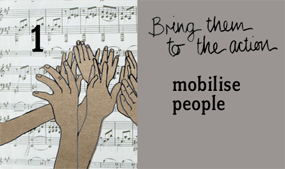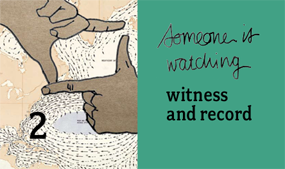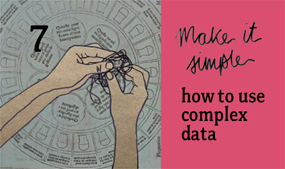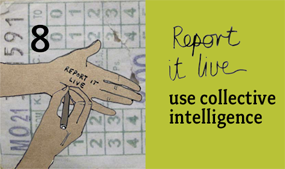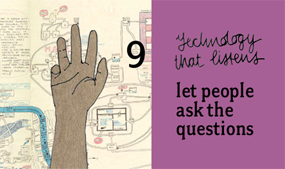A few months ago we reported that a new record was set for “10 tactics” screenings: nine different events were scheduled over one week in North and South America, including seven events in Mexico. The organisation responsible for these Mexico screenings is the Ibero-American Network for Sustainable Development (known for its acronym in Spanish, REDDES).
Juan Casanueva, who helped organised the screening events, says: “REDDES is aware that society must participate actively in its own development and this requires the appropriation of technology ...When we came across the release of '10 tactics', we immediately understood the value of the film both as a 'hands-on' guide for advocates and as proof of adequate use of digital technology tools for and by society.”
The seven Mexican screenings organised by REDDES were hosted by NGOs and universities in five regions of Mexico and they were attended by over 350 people. The events not only screened the 10 tactics film but also included debates, forums and training.
A wide variety of opinions, suggestions and discussion topics were addressed by the audiences after the screenings were held. Audience members included local development, human rights and gender equality activists, NGO personnel, university faculty and students. Common themes included the need for capacity building in the non-profit sector, the risks and benefits of today's digital technology and shared local cases of the use of digital technology tools as means to promote education, campaigns, human rights, community development and citizen participation.
10 tactics in Xalapa
The first screening was held on February 22 in Xalapa as part of REDDES “Open Seminars”. This great first event threw up some interesting examples. One viewer highlighted the long-lasting tradition of media usage for local community development in Veracruz, where community radio has long been a medium for local groups to deliver educational, cultural, social and political messages to scattered villages in impoverished rural areas. Based on such a vibrant use of local radio, some local NGO leaders highlighted the opportunity that new technology could have to empower social groups in rural Veracruz. A couple of the participants considered themselves good technology users, for example back in Mexico's 2006 election the first social gatherings were mobilised through Facebook, however they reported that 10 tactics demonstrated a wider variety of ways to use new technologies. '10 tactics' inspired one women's rights activist to start geo-tagging women's abuses on a map of the region.

10 tactics in Tapachula
Tapachula saw the second screening on February 24 which was hosted jointly by the Research Centre on Ecology and Migration (ECOSUE) and a local migration rights protection organisation, NGO Centre de Derechos Humanos Fray Matias de Cordova. The discussion after the film centred around digital technology for social purposes. Participants from Save the Children, Mexico, described their project of digital inclusion on Mexico's southern border and how they are working in elementary schools to involve school kids to use digital technology as a tool to express themselves. They went on to note that Mexican children were very innovative when using computers to communicate and they could influence the older generations, encouraging them to be more active in the use of technology for social purposes. Many of the audience members echoed that they need training and more assistance on the use of digital tools, and to improve and make use of the technological skills they already have. One participant said this about the film, “10 tactics encourages the viewers to follow info-activism examples in order to promote and create new expression and social action mechanisms.”

10 tactics comes to Mexico City
The third screening was on February 25 in Mexico City and it was hosted by one of Mexico's most active human rights NGOs, the Centro de Derechos Humanos (CDH Pro). Those from local and international NGOs, such as a vast team from Amnesty International Mexico, joined together to watch the film. The main debate ran around two main issues regarding the impact of technology in activism and development: education and getting the right message across to the target population. NGOs and advocates see education as the key driving force for amplifying the use of technology in activism and development; they consider themselves as lacking the capacity to use most of the tools shown in 10 tactics, and there were also complaints that 10 tactics did not show any Latin America case studies! In response to that need, REDDES and CDH Pro made a public alliance to hold at least one capacity building workshop on multimedia production, social web and CiviCRM during this year. Those advocates involved in communication agreed that the right message is key to success: to deliver the right message in the right format to their target audience. One suggestion was for advocates to test their communication products and to involve the target audience in the production message and stories as much as possible. Gerardo Betancourt, a student, said that “those interested in a topic can nowadays get access to tonnes of information.” There was considerable uproar at the Mexican mobile phone carrier that has very strict texting and voice over IP usage rules, to the extent that 10 tactics previewed tools such as FrontlineSMS cannot be used in the country. Amnesty International representatives told the group of their new strategy to keep advocates, volunteers and followers informed in Mexico by using paid SMS texting. Smaller NGOs, mostly slum-communities right defenders and capacity-builders, exchanged their experience with using video as a powerful tool for awareness campaigns, education and social communication. A couple of NGOs also shared their experiences using Facebook and YouTube as a communication tool but raised questions about the copyright risks that have to be taken into account while posting self-made and other people's videos on public social media sites.

10 tactics in the State of Mexico
February 26 in the State of Mexico, in the centre of the country, the fourth screening was hosted by University ITESM Campus Estado de Mexico was the fourth screening. Two top Latin American academics, Dr Fernando Guitièrrez and Dr Alfredo Troncoso spoke about the role of digital technology tools for social purposes and on the risks and opportunities of the use of new technologies. Dr. Troncoso spoke of the real possibility that digital technology can deeply impact the marginalised groups and communities in a more positive way than those who have been historically better-off. “Such opportunities were backed-up in many cases seen in 10 tactics especially those that show new affordable technology is helping give voice to the voiceless and that free knowledge exchange of relevant information can be useful to people's basic needs for collective action”. He noted that the term info-development should be socialised and researched just as Tactical Tech has promoted info-activism. He highlighted the three key factors that can promote technological adoption for social purposes are technological relevance, cultural compatibility and economic benefits. Dr Guitierrez gave an academic background on Neil Postman's thesis on technological change, the main points being that every technological change brings and involves costs and benefits; technology benefits some but impacts negatively others, behind technology there is a philosophy and transformation power, change is ecological and non-additive. In each culture, technological change takes a different role and people tend to demystify new technologies.

10 tactics returns to Mexico City
The fifth screening was on March 1 in Mexico City and shown as part of the university ITESM Campus Ciudad de Mexico NGO day. Alongside students were 15 Mexican NGOs including Doctors without Borders, Greenpeace, Oxfam Mexico and Amnesty International as part of a talk on ICTs for development. The 15 Mexican NGOs that saw the film are in contact with REDESS to host future screenings.

10 tactics in Mèrida
March 10 saw the penultimate screening in Mèrida by local NGO IEPA A.C. The host organisation led a self-reflective session about their own technological skills. After identifying the value that the use of digital technology tools had for them and other NGOs they evaluated their digital capacities and concluded they were still too limited. Even though they were active online and had filmed a documentary based on a video-survey in which they asked Mayan people of the Yucatan area the needs and challenges regarding indigenous education. They decided to gain further training on techniques and tool-use in the region. The use of these tools was seen as the most important factor to support child rights activities and defence in the Mayan region. The first thing to do in the region, they said, is to train social workers and activists with easy-to-use digital tools. They also considered that if more NGOs used internet-based tools, a cooperating scheme could be fostered where NGO personnel could exchange knowledge. An idea which sprung up from the event was geo-tagging data about key information related to availability and infrastructure of indigenous education in order to show the inequality in education infrastructure and access for indigenous population in Yucatan. 
Screening number seven of 10 tactics in Cholula
The final screening in this exciting Mexican 10 tactics tour happened on March 17 at Cholula and was hosted by the Education, Communications and Political Science department of the University de las Americas Puebla (UDLAP). Dr. Bertha Salinas, a renowned Mexican researcher on ICTs for Development, Education and NGO studies introduced the event as an opportunity to become active in this area. One of the regions most important human rights activist, Gustavo Rodriguez from CCP A.C. talked about the human right situation in the state of Pueblo and its surroundings. Many participants were shocked after knowing that they were in one of Mexico's most threatening and insecure regions that has more missing women than the drug-trafficking border city of Ciudad Juarez. Upon hearing a groups formed aimed at coming up with info-activism projects and strategies that would address the region's worst problems. One college math student came up with the idea of posters in popular spaces reading “women for sale” and a website under it which would bring people to a website dedicate to spreading awareness about the statistics on missing and murdered women.

Before these event Juan from REDDES said that he hoped that advocates in Mexico will “see in 10 tactics key examples of what has been done by advocates in other countries and feel inspired to actively use digital technology for rights, social inclusion, governmental accountability, anti-corruption, equality and policy enforcement advocacy.” These inspirational stories from the seven screening event make it clear that this goal has been achieved.
Thanks to Reddes 10 Tactics will be screened the 29th of May on the main night of Mexico's International Human Rights Film Festival.
For Spanish screening notes click on the "testimonies" link on this page. Screening photos and videos are available at the REDDES Facebook fan page.
Screening stories by REDDES with introduction/conclusion by Tactical Tech. Photos by REDDES. Top: Juan Casanueva introducing "10 tactics" in Xalapa. Middle one: Juan Casanueva speaking on skype with the audience at Tapahcula. Middle two: Screening at Mexico City introduced by Miguel Agustín PRO Juárez. Middle three: Dr Fernando Guitièrrez and Dr Alfredo Troncoso speaking at the University ITES Campus Estado de Mexico. Middle five: Students and NGO workers are shown "10 tacitcs" during a NGO day at the ITESM Campus Ciudad de Mexico. Middle six: REDDES joins the screening in Mèrida. Bottom: "10 tactics" shown at the University de las Americas Puebla.









